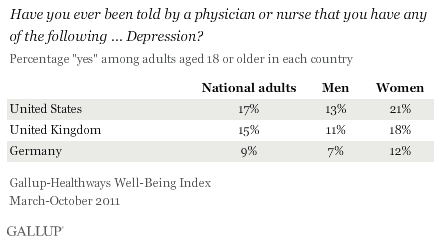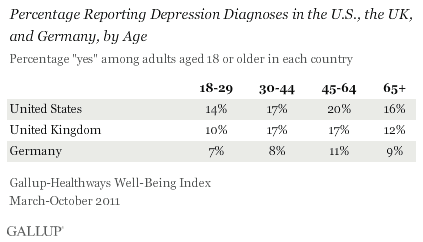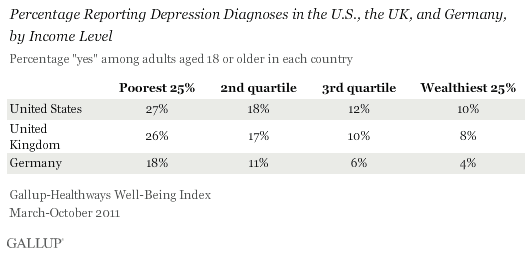WASHINGTON, D.C. -- Adults in the United States (17%) and in the United Kingdom (15%) are significantly more likely to report having been diagnosed with depression in their lifetime than are adults in Germany (9%). In all three countries, women are more likely than men to report a depression diagnosis.

American and British men and women are also more likely than German men and women to report having been diagnosed with depression.
The results are from Gallup-Healthways Well-Being Index tracking in all three countries, based on interviews conducted from March through October 2011.
Depression Diagnoses Increase With Age in the U.S. and UK, but Not in Germany
Depression diagnosis rates are in the double digits across all age groups in the U.K. and the U.S. In the U.S., depression diagnoses increase with age until dropping off among those aged 65 and older. In the U.K., those between the ages of 30 and 64 are most likely to report depression. In the U.K. and U.S., the differences in depression by age persist after controlling for income and gender.
Age, however, does not make a significant difference in depression diagnoses among age groups in Germany, after taking into account a respondent's income and gender.

Poorest 25% in U.S., UK, and Germany Most Likely to Report Depression
Depression in all three countries is most prevalent among the poorest 25% of the population. More than one-quarter of the poorest 25% of Britons and Americans report having been diagnosed with depression, compared with 17% of Germans. Among the wealthiest respondents, Germany again has nearly half as many (4%) adults who report depression than does the U.K. (8%) and the U.S. (10%).

Bottom Line
Germans are less likely than Americans or Britons to report having been diagnosed with depression in their lifetime. Across the three countries, woman and low-income adults are more likely to report a depression diagnosis. These data provide insight into which groups in all three nations may be most in need of resources to help them address what can be a debilitating and costly condition.
Numerous factors likely influence self-reported rates of depression across countries and demographic groups, including to seek professional help for the condition. Regardless, further investigation into why depression diagnosis rates are lower in Germany than in the United States and U.K. may shed additional light on the qualities and characteristics of people who report not having the illness.
About the Gallup-Healthways Well-Being Index
The Gallup-Healthways Well-Being Index tracks well-being in the U.S., U.K., and Germany and provides best-in-class solutions for a healthier world. To learn more, please visit .
Survey Methods
Results are based on telephone interviews conducted as part of the Gallup-Healthways Well-Being Index survey March 7-Oct. 31, 2011, with a random sample of 7,728 adults living in Germany and March 1-Oct. 31 with a random sample of 7,839 adults living in the U.K. and 241,521 adults living in the U.S., aged 18 and older, selected using random-digit-dial sampling.
For results based on the total sample of national adults, one can say with 95% confidence that the maximum margin of sampling error is 卤1.5 percentage points for Germany, 1.3 percentage points for the U.K., and less than 1 percentage point for the U.S.
Interviews are conducted with respondents on landline telephones and cellular phones.
Samples are weighted by gender, age, education, region, adults in the household, and cell phone status. Demographic weighting targets are based on the most recently published data from the German Statistics Office. All reported margins of sampling error include the computed design effects for weighting and sample design.
In addition to sampling error, question wording and practical difficulties in conducting surveys can introduce error or bias into the findings of public opinion polls.
For more details on Gallup's polling methodology, visit .
